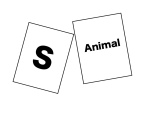Holiday Card Games for Language
 To continue our Holiday List for family games that are fun and target language skills, too, my students have a few favorites in the card game category.
To continue our Holiday List for family games that are fun and target language skills, too, my students have a few favorites in the card game category.

Putting your thinking cap on can take on a literal meaning when you play HedBandz. (Thanks to Stephanie for this idea.) It’s a favorite of elementary school kids and looking silly playing the game can create lasting memories. Each player wears a headband with a card in it. More importantly players have to ask yes or no questions and remember the answers. I talk about categories with students and how a category is the road map for where you are going with a word’s definition. Discovering your mystery word’s category helps you find the meaning faster.
ASAP is another card game that helps with word-finding. You can make your own ASAP game if the mood strikes you. One player holds a deck of 26 categories and the other player has a deck of 26 letters. Each player lays a card for their deck on the table at the same time and whoever can name a word from the category that starts with the letter sound keeps the letter card. Whoever has the most cards at the end of the game wins.

If you are one to “size up” the competition, In a Pickle is the a game for you. It’s a card game for 2-6 players that involves placing cards whose object is larger or smaller than the target card. Players have to consider if a museum is larger than a library or if a giraffe is larger than an elephant. While placing cards by order of size, players have to consider multiple meanings of words and how words relate to each other – a great vocabulary skill game. I like to tell stories about the cards we are playing to work on narrative skills, as well.

If you are too hip to be square, then try Spot It (thanks to Karen for the idea) which is a round card game for all ages working on word retrieval, perceptual skills and cognition. Players are looking for one common feature between cards and when they Spot It, they call it out (word retrieval). It’s a favorite of tutors and therapists. It gives kids success and encourages word retrieval for object names. The high schoolers enjoy it just as much as the elementary students.

Finally, Apples to Apples has a game for any age. Younger players can play the junior version while older students prefer the regular version. It’s a game of comparison and analogies and while I’m sold on the language value of the game, kids, teens and adults just think it’s great fun.
Laughter is good for any age and these games are sure to bring out the giggles. In the next Language Games post, we’ll talk about games to improve sentence skills.

